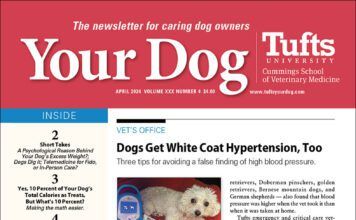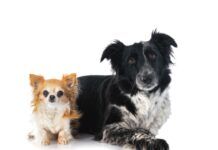Some Dog Breeds Appear More Sensitive to Pain Than Others
There has been a belief among veterinarians that some dog breeds are more sensitive to pain than others. And new research suggests they are right. But the breeds commonly thought to be particularly pain-sensitive may not be the ones that truly are. That’s because vets appear to be making their determinations based on dogs’ reluctance to come over to them and interact in novel situations rather than on the animals’ actual sensitivity to pain.
Dog won’t stop eating poop
Q: Our 3-year-old Havanese is a great leash puller and sniffer, a mostly wonderful dog except for her absolute certainty that the poop of other animals makes a terrific snack. Since her legs are close to the ground, she’s fast and very good at lunging suddenly when she wants to grab some “delicacy.” We — not the youngest kids on the block — are outwitted at every turn. Bunny poop, goose poop, dog poop — she is not particular. A trainer we consulted thought we might try using a device that issues a high-pitched sound to make negative associations for her at those moments. But I’m not sure I have enough hands to carry the device on a walk, much less mobilize it in a timely fashion. And I’m not sure it’s a good approach. I’d appreciate any advice you can offer.
Download The Full September 2023 Issue PDF
- The Biggest Predictor of Canine Health
- Short Takes
- Summer’s Over, But Heartworm Season Is Forever
- The Benefits of Online Training
- It’s Okay to Comfort Your Dog
- Protect the Mail Carrier!
- The One Word Your Dog Will Never Understand
- Dear Doctor
The Biggest Predictor of Canine Health
Maybe money can’t buy happiness, but it can buy health. In looking over survey data collected on more than 21,000 dogs, researchers working on a nationwide initiative called the Dog Aging Project found that a higher household income was associated with better health for the dog in the home. No surprise there. More money means pets receive better medical care. What was surprising was that the company of other dogs and even companion animals of other species, such as cats, had a positive health effect that was five times greater than the effect of family income. A vibrant canine social life even had a bigger impact than house-
hold stability.
Older Dog Can’t Sleep? It Could Be Dementia
If your older dog has begun pacing the floors at night and having trouble settling down, it could be a sign of dementia, just as people with age-related dementia may feel restless at night with a sign of Alzheimer’s disease known as sundowner’s syndrome. When researchers at North Carolina State University studied 28 dogs ages 10 to 16, they found that those with dementia took longer to fall asleep and spent less time sleeping. The higher the dementia score, the less time the dogs spent in both REM and non-REM sleep.
Stay Calm in the Presence of a Dog-Phobic Person
It’s an unfortunate catch-22: People who are nervous around dogs are the ones who tend to bring out their aggressive tendencies. Their anxiety transfers to the animal. Research has shown, in fact, that anxious people have a higher incidence of getting bitten by a dog.
For That Last Good-Bye
More and more people are opting for euthanasia at home. It could cost about $100 more than at the veterinarian’s office, but it allows a dog to drift off peacefully in his favorite spot. It also allows you to grieve without having to drive or be around other people.
Summer’s Over, But Heartworm Season Is Forever
You might assume that because heartworm disease makes its way to dogs via mosquitoes, those dogs who live where temperatures fall too low to support mosquito life don’t need year-round protection from this illness, which can cause lasting damage not only to the heart but also the lungs and arteries. But mosquito species keep adapting to better withstand cold climates. And some mosquitoes do perfectly fine huddling up in homes over the winter months. That’s no doubt at least part of the reason that heartworm disease has found new footholds in cooler, dryer regions.
It’s Okay to Comfort Your Dog
There’s a school of thought that says comforting a fearful or anxious dog is counterproductive because it teaches him that whatever he’s afraid of is in fact scary and will only reinforce the distress. Thus, not to make their dog even more upset, people go against their instinct to soothe their pet in distress and act like nothing’s wrong.
Protect the Mail Carrier!
An average of almost 15 mail carriers a day were bitten by dogs last year, according to the U.S. Postal Service — more than 5,300 over the course of 2022. It is not dogs with a history of threatening or outright dangerous behavior that are doing the biting. “It is usually a ‘good dog’ that had not previously behaved in a menacing way,” according to U.S. Postal Service Occupational Safety and Health Senior Director Linda DeCarlo. Indeed, many attacks reported by letter carriers came from dogs whose owners regularly stated, “My dog won’t bite.” It’s not surprising. Even gentle dogs can be very protective of their turf, taking their human families off guard.
The One Word Your Dog Will Never Understand
Your dog’s begging at the table has gotten out of hand. You’re happy to drop him a piece of food here and there, but when you say no, he keeps beseeching — putting his head right at the table ledge even when you tell him to move away, staring at you, yawning, whining, and perhaps even nudging you with his paw.
The Dog is Embarrassing Me
Q: When I walk my dog and he sees people — or other people walking their own dog — he barks and pulls or walks on his hind legs because he’s so excited. It’s so embarrassing that I avoid taking him for walks, or I turn in the opposite direction when I see people to avoid my dog making a scene. He also pulls, but I bought a harness to replace his neck collar, which helps with that. Do you have any recommendations?














